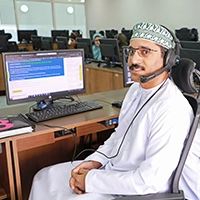
| Type | Postgraduate |
| Language | English |
| Duration | 2 Years |
| Study mode | Full Time |
| Credit Units | 24 |
The Master of Arts in Translation and Interpreting (MA Translation and Interpreting) is an elite postgraduate program offered over two academic years, designed to forge the next generation of language professionals. Conducted primarily in English, with Arabic employed for hands-on translation and interpreting exercises, as well as for linguistic analysis, this program sets a high standard in academic and practical training. It targets the development of expert translators and interpreters, translation instructors, and language specialists for employment in both the public and private sectors, including freelance ventures.
A cornerstone of the MA Translation and Interpreting program is its blend of practical training with the latest in translation technology. This approach ensures graduates are not only proficient in traditional translation and interpreting skills but are also adept in leveraging technological tools essential in today’s global communication landscape. The curriculum is meticulously designed to cover a wide spectrum of fields such as marketing, advertising, localisation, legal, media, publishing, healthcare, education, and scientific research, preparing students for diverse career opportunities.
Moreover, the program emphasizes research in its second year, furnishing students with the advanced knowledge, skills, and competencies needed for further academic pursuits, including PhD studies in Translation and Interpreting Studies. This research component enriches the students’ understanding of the theoretical underpinnings of their practice, enabling them to contribute to the field’s body of knowledge.
By integrating practical experience, specialization in language pairs, a focus on cutting-edge technology, and rigorous research, the MA in Translation and Interpreting aspires to cultivate professionals who are not only skilled in the art and science of translation and interpreting but are also equipped to face the challenges and embrace the opportunities of a rapidly evolving global communication landscape. This program stands as a beacon for those aspiring to achieve excellence in translation and interpreting, paving the way for a successful and impactful career.
Within Oman:
- Government and Diplomacy: Working in various government departments, ministries, and diplomatic missions where there is a need for skilled translators and interpreters to facilitate international relations, legal documentation, and cross-cultural communications.
- Healthcare: Employment in hospitals and medical centers as medical interpreters or translators, where there is a growing demand for professionals who can provide accurate translation of medical documents and interpret patient-provider communications.
- Education: Serving as language instructors, translation studies academics, or curriculum developers in educational institutions that offer language and translation programs.
- Tourism and Hospitality: Opportunities in the tourism sector, including roles in hotels, travel agencies, and tourist attractions that require staff to communicate with non-Arabic speaking visitors.
- Media and Broadcasting: Positions in media houses, publishing firms, and broadcasting companies for the translation of content, subtitling, and interpretation for interviews and broadcasts.
- Legal and Consultancy Services: Working with legal firms, consultancies, and corporate entities that require translation of legal documents, contracts, and business communication.
- Localization and Technical Translation: Engaging in localization projects for multinational companies, software firms, and online platforms that seek to adapt their products and services for the Arabic-speaking market.
- International Organizations: Employment with the United Nations, World Bank, International Monetary Fund, and other international bodies that require interpreters and translators for their global operations and communications.
- Conference Interpreting: Providing services at international conferences, summits, and meetings where bilingual or multilingual interpretation is essential.
- Freelance Translation and Interpreting Services: Establishing a freelance career that allows for working with a diverse array of clients on projects that span across different industries, including technology, entertainment, and education.
- Translation and Localization Management: Roles in project management within translation and localization firms, focusing on bridging language and cultural gaps in content across various platforms.
- Research and Development: Contributing to the field of translation and interpreting studies through research, which can also lead to PhD studies and academic positions in universities around the world.
- Hold a bachelor’s degree in any discipline from a recognized HEI with: a) a cumulative GPA of ≥2.5 out of 4.00 or equivalent for fresh graduates, OR b) a cumulative GPA of ≥2.00 out of 4.00 or equivalent for candidates with at least two years of professional experience as translators, interpreters, revisers, translation project managers, communication specialists, public/external/international/client relations officers, or any relevant career in the language industry.
- Have an IELTS band score of 6 or TOEFL score of 60-78 (iBT) or equivalent.
- Pass an admission interview at the Faculty of Language Studies.
- Pass three bridging courses if the bachelor’s degree is obtained in a non-language or non-translation discipline.
| Year | Semester | Units | Fee Per Unit (OMR) | Total Fees OMR |
|---|---|---|---|---|
| First Year | 1 | 8 | 150 | 1200 |
| 2 | 8 | 150 | 1200 | |
| Second Year | 3 | 4 | 150 | 600 |
| 4 | 4 | 150 | 600 | |
| Grand Total | 24 | – | 3,600 | |
 العربية
العربية
